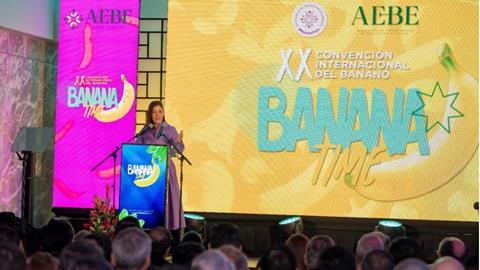Industry show in Guayaquil celebrates growth of Ecuadorian banana exports but discusses the various challenges currently facing the sector, from security to climate change
The Association of Ecuadorian Banana Exporters (AEBE) welcomed a host of influential guests to the 20th international Banana Time convention this week.
The event in the port city of Guayaquil, which ran from 23-27 October, was attended by 87 Ecuadorian banana exporters and more than 80 participating companies, as well as a number of key political figures.
Among others, Ecuador’s minister of foreign trade Daniel Legarda attended the opening ceremony, as did minister of agriculture Eduardo Izaguirre and Charles Michel Geurts, the EU’s ambassador to Ecuador.
Banana Time is aimed at industry experts, national and international media, and the general public, with the aim of promoting the development Ecuadorian banana exports.
Marianela Ubilla, president of the AEBE board, began the convention with a speech highlighting the event’s crucial role in facilitating the buying and selling of products, services and processes in the banana sector.
“Our great mission is to boost economic integration between the different countries that participate,” she told the audience. “Banana Time represents a comprehensive platform for the exchange of knowledge and the promotion of business opportunities in the banana industry. This product shows an increase of seven per cent in export volume and 18 per cent in FOB dollars compared to the same period in 2022, which shows that today more than ever, it is time for Ecuadorian bananas. However, we must remain alert.
“Our main markets are facing inflation, which could reduce the purchasing and consumption capacity of bananas in international markets. In addition, there are multiple challenges that the sector must continue to face, especially in terms of security, climate change, phytosanitary protection and the use of trade agreements.”
The four-day event boasted a varied programme including commercial exhibitions, business roundtables, and a conference forum, covering topics including: sustainability, safety, phytosanitary protection, production and consumer trends in international markets, labour relations, and the projected performance of the sector in 2024.
Also up for discussion were the effects of El Niño in Ecuador and initiatives to reduce the carbon footprint and water use of banana production.
Additionally, there was a special promotion of the innovative and varied ways that bananas can be used in Ecuadorian cuisine, led by one of the most important culinary institutions in Guayaquil, the School of Chefs.




